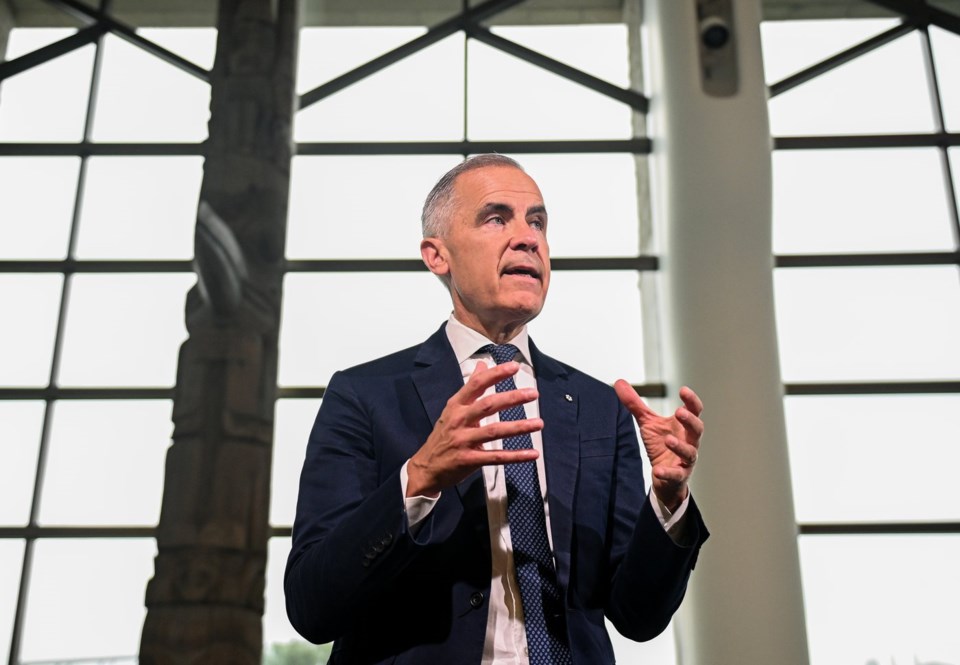OTTAWA — Prime Minister Mark Carney said he was optimistic about finding consensus on the Liberals' major projects law as he met with hundreds of First Nations chiefs on Thursday, but by mid-afternoon some leaders had walked out of the summit.
Mohawk Council of Kahnawake Grand Chief Cody Diabo says he took the microphone to express his frustration before leaving the meeting, saying chiefs expected to have time to engage with the prime minister and cabinet ministers but instead were asked to talk to one another.
"I don't even know what this is, but this is not engagement. This is definitely not consultation. I'm speechless," he said after leaving the meeting.
Diabo said it seemed like the government was trying to gather people who support its plan, and called the meeting "a facade."
Carney clarified his interpretation of Thursday meetings in his closing statement, recorded by a chief participating in the summit and provided to The Canadian Press.
"This was never a consultation. This was not a consultation today. This is engagement," he said.
Carney went on to say that once consultations start on specific projects, the repeated process will result in shared prosperity and a gradual rebuilding of trust between the government and First Nations.
Carney told chiefs in the room that he hoped to have the federal Major Projects Office, which will lead work on streamlining developments, and its associated Indigenous Advisory Council set up by Labour Day.
In the morning, Carney said he was planning to spend the day listening to First Nations leaders' concerns about the Building Canada Act, which allows the government to fast track major projects that it deems to be in the national interest.
"I will say a few words at the start and answer questions at the end but I'm here to listen, engage and move forward from that," Carney told reporters before the meeting began.
He was greeted with cheers as he took the stage Thursday morning to deliver opening remarks.
"The economic value of these projects will be shared with First Nations as partners; it will help build the prosperity of your communities for generations to come," Carney said as he began the meeting.
After his brief remarks, media were escorted out of the room and barred from hearing Assembly of First Nations National Chief Cindy Woodhouse Nepinak address the hundreds of chiefs gathered at the Canadian Museum of History in Gatineau, Que.
The AFN advocated for the entire meeting to be made public, and Woodhouse Nepinak later apologized for having to hold a press conference outside of the museum.
"You should have been in there, and you should have been able to hear my speech," she said.
The closed-door meeting was promised in June after chiefs said their rights were not respected by the government pushing the legislation through Parliament. The law was passed, with support from the Conservatives, less than a month after it was introduced.
It allows cabinet to quickly grant federal approvals for big industrial projects that are deemed to be in the national interest, including by sidestepping existing laws.
Former national chief Ovide Mercredi addressed Carney directly in the meeting, saying Carney is asking for First Nations to have faith in the government and the legislation, despite it causing fear among leaders.
"There's always a limit to our conversations in forums like this. But if you come to our territory, we will honour you. We will treat you with the respect you deserve as the head of this country," Mercredi said in the recording shared with The Canadian Press.
"But at the same time, we would expect you to honour our people and our leaders likewise," he continued before receiving a standing ovation.
Sheila North, the former grand chief of Manitoba Keewatinowi Okimakanak and proxy for Bunibonibee Cree Nation, said she was disheartened by the moderators trying to limit Mercredi's speaking time.
"Ovide Mercredi is one of the First Nations most respected and sought-after knowledge keepers in our country," North said in a statement to The Canadian Press.
"Prime Minister Mark Carney and his government would signal to many of us that they are serious about building relationships if they followed Ovide's advice."
Earlier in the day, Carney told reporters that Thursday's meeting is the first step in a process.
"As we're building our nation, we're building all nations, building together, building in partnership," he said.
"Today we'll be talking about building in partnerships with First Nations, in some cases in partnership, in some cases with projects led by First Nations."
He stressed that the law is enabling legislation and the government has not yet identified the national-interest projects it intends to fast track.
"Which ones do First Nations, do provinces, do the people of Canada want to move forward on? That takes work," he said.
Many First Nations leaders said Wednesday they had low expectations for the meeting and are warning it should not be seen as the full consultation required on major projects.
When asked if he thinks the government can get consensus from First Nations leaders about how to move forward, Carney said: "Yes I do."
"Everyone wants to make the country better. Everyone wants better opportunities for their children. Everyone want more resources for social services, for health, for education, for community services," he said.
The government plans to hold similar meetings with Inuit and Métis leadership.
He also pledged to launch a regional dialogue with First Nations and further consultation processes going forward.
— with files from Sarah Ritchie and Craig Lord
This report by The Canadian Press was first published July 17, 2025.
Alessia Passafiume, The Canadian Press



